

The P.A. - News, Stories, and More from Virtual High School. Let’s examine key study skills so you can avoid the temptation to take short cuts when writing papers, listening to instructional videos or lectures, or studying for quizzes, tests, or exams.
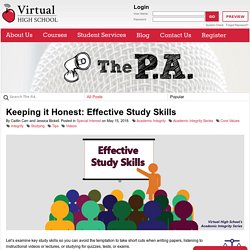
Working with credible sources will allow you to create writing and presentations that reflect valid ideas and research. Consider the following questions: Who created the source? Research the author you are using to determine what background and skills the writer has. Why is that person a reliable expert on the topic? For effective note-taking: Avoid copying research word-for-word. To paraphrase means to write a text that is similar to the original, but the new passage must be written in your words. Reread unclear sections at least twice. Learning effective study skills will lead to academic success during your time at Virtual High School. This post is part of our Academic Integrity Series. Who created the source? For effective note-taking: Teaching Students to Legally Use Images Online. Teaching Students to Avoid Plagiarism.
TeachersFirst: Embracing Reseach - Primary Students. Research/Information literacy projects with primary students Do your students understand the difference between reading fiction and reading informational texts?
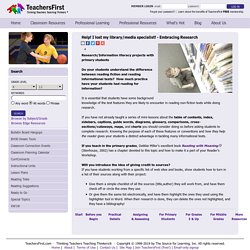
How much practice have your students had reading for information? It is essential that students have some background knowledge of the text features they are likely to encounter in reading non-fiction texts while doing research. If you have not already taught a series of mini-lessons about the table of contents, index, sidebars, captions, guide words, diagrams, glossary, comparisons, cross-sections/cutaways, maps, and charts you should consider doing so before asking students to complete research.
Knowing the purpose of each of these features or conventions and how they help the reader gives your students a distinct advantage in tackling many informational texts. Will you introduce the idea of giving credit to sources? TeachersFirst: Embracing Reseach - Grades 3-5. [K-6] Doing Internet Research at the Elementary Level. One of the hardest things to teach, in my opinion, is research.
![[K-6] Doing Internet Research at the Elementary Level](http://cdn.pearltrees.com/s/pic/th/internet-research-elementary-150378726)
I have been teaching in a computer lab for going on five years and I have never taught research the same way twice. This is partially because I never teach anything the same way twice, but it's also because each year I learn something new. Sometimes I learn the hard way when things don't pan out the way I planned in the classroom, sometimes I learn because something I didn't plan arose and worked out well, and sometimes its due to my own self-education as I prepare to teach my annual research unit.
I begin teaching research skills in third grade -- just at the time where my students' reading skills are such that they can feel successful and just at the time when they have mounds and mounds of natural curiosity. Elementary Research Rubric. University of Wisconsin - Stout — Schedule of Online Courses, Online Certificate Programs, and Graduate Degree Follow us on.
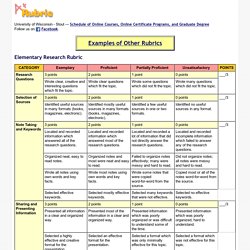
Website Evaluation Sheet (Elementary) TeachersFirst: Embracing Reseach - Middle School. Research/Information literacy projects with students in middle grades How will you help students to build a good search?
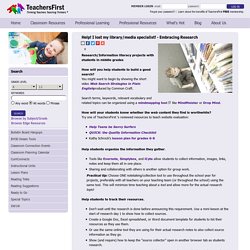
You might want to begin by showing the short video Web Search Strategies in Plain Englishproduced by Common Craft. Search terms, keywords, relevant vocabulary and related topics can be organized using a mindmapping tool like MindMeister or Drop Mind. How will your students know whether the web content they find is worthwhile? Try one of TeachersFirst ‘s reviewed resources to teach website evaluation: Untitled. Put an End to Plagiarism in Your Classroom. According to a report by Plagiarism.org, "Studies indicate that approximately 30 percent of all students may be plagiarizing on every written assignment they complete.
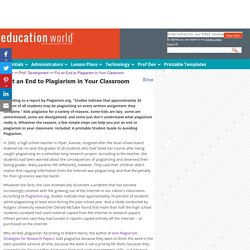
" Kids plagiarize for a variety of reasons. Some kids are lazy, some are unmotivated, some are disorganized, and some just don't understand what plagiarism really is. Whatever the reasons, a few simple steps can help you put an end to plagiarism in your classroom. Included: A printable Student Guide to Avoiding Plagiarism. In 2002, a high school teacher in Piper, Kansas, resigned after the local school board ordered her to raise the grades of 28 students who had failed her course after being caught plagiarizing on a semester-long research project. Whatever the facts, the case dramatically illustrates a problem that has become increasingly common with the growing use of the Internet in our nation's classrooms. Home - Plagiarism.org. Research Paper [Step-by-Step Guide] Information Literacy in the Classroom.
5 Components of Information Literacy. Critical Evaluation. Purdue OWL. This page is brought to you by the OWL at Purdue University. When printing this page, you must include the entire legal notice. Copyright ©1995-2018 by The Writing Lab & The OWL at Purdue and Purdue University. All rights reserved.
This material may not be published, reproduced, broadcast, rewritten, or redistributed without permission. Use of this site constitutes acceptance of our terms and conditions of fair use. If you are having trouble locating a specific resource, please visit the search page or the Site Map. The Online Writing Lab (OWL) at Purdue University houses writing resources and instructional material, and we provide these as a free service of the Writing Lab at Purdue.
For more information about services for the Purdue University community, including one-to-one consultations, ESL conversation groups and workshops, please visit the Writing Lab site. Mission A Message From the Coordinator.